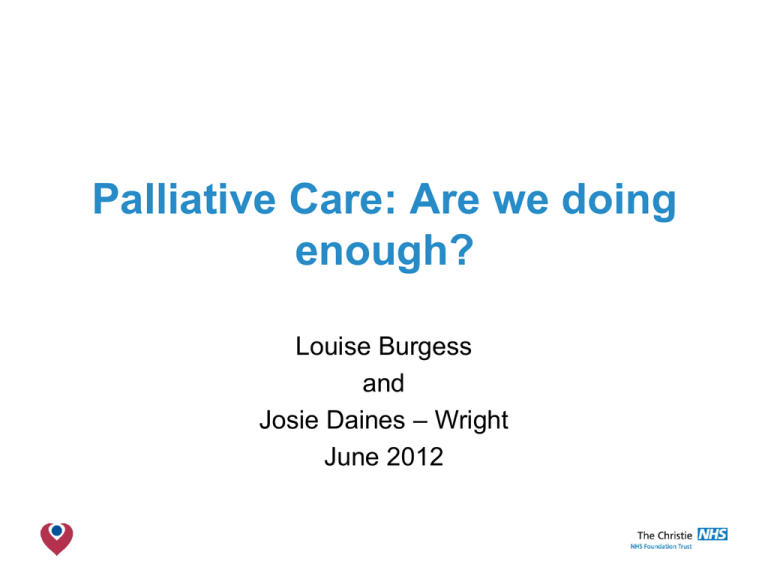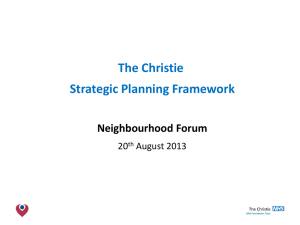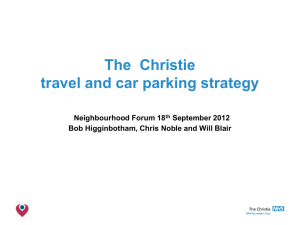Palliative Care: Are we doing enough?
advertisement

Palliative Care: Are we doing enough? Louise Burgess and Josie Daines – Wright June 2012 The Christie NHS Foundation Trust Aims • The Christie Hospital and Haematology Transplant Unit • Definition of Palliative Care • Advance Care Planning and Palliative Care Tools • The North West End of Life Care Model • Palliative Care and Haematology • Our Review • Recommendations The Christie NHS Foundation Trust The Christie NHS Foundation Trust The Christie NHS Foundation Trust Palliative Care “an approach that improves the quality of life of patients and their families facing the problems associated with life threatening illness, through the prevention and relief of suffering by means of early identification and impeccable assessment and treatment of pain and other problems, such as physical, psychosocial and spiritual” (WHO 2002) The Christie NHS Foundation Trust What is Advance Care Planning? • Discussion between patient and professional • Addresses patient’s: - understanding of illness and prognosis - concerns - values or personal goals for future care - preferences for care The Christie NHS Foundation Trust Palliative Care Tools • Advance Directives – Including Cardiopulmonary Resuscitation Not for • Gold Standard Framework (GSF) • Sheffield Profile for Assessment and Referral to Care (SPARC) Holistic Assessment • Preferred Priorities for Care • Rapid Discharge Pathway • Liverpool Care of The Dying Pathway The Christie NHS Foundation Trust The North West End of Life Care Model Gold Standards Framework (GSF) Preferred Priorities for Care (PPC) Rapid Discharge Pathway (RDP) Liverpool Care Pathway for the Dying (LCP) 1 Advancing disease 1 year and beyond 2 Increasing decline 6 months 3 4 Last Days of Life First Days after Death Death 5 Bereavement 1 year The Christie NHS Foundation Trust Palliative care and Haematology • Infrequent palliative care (NICE 2003) • Palliative care in Haematology researched (Grundy 2006) is under • Complex and uncertain Haematology pathway (Howell 2010) The Christie NHS Foundation Trust Objectives To review the palliative and end of life care of Allogeneic Transplant patients that died between the period of March 2010 and October 2011 The Christie NHS Foundation Trust Method • Retrospective review of 12 Allogeneic Transplant patients that died between 2010 and 2011 • Information reviewed: - Length of stay - Place of death - Implementation of Liverpool Care Pathway - Involvement of Hospital Palliative Care Support Team The Christie NHS Foundation Trust Results • Length of stay – 18 – 164 days, median 50 days • 3 out of 7 patients died on the Liverpool Care of the Dying Pathway • 2 out of 12 died in their preferred place of care The Christie NHS Foundation Trust Place of Death The Christie NHS Foundation Trust Cause of Death The Christie NHS Foundation Trust Reason of Referral to Palliative Care Support Team The Christie NHS Foundation Trust Key Results • Referrals to palliative care support team were for advice on end of life care • Patients with palliative care team involvement were transplant related mortalities • Patients with relapsed disease had no referrals made to the palliative care support team The Christie NHS Foundation Trust Conclusions and Recommendations • Palliative and supportive care needs going unrecognised and and specialist referrals not being made (NICE 2004) • The use of service models to ensure that patients, their families, and carer, all receive support and care to help them cope with cancer and its treatments at all stages (NICE 2004) The Christie NHS Foundation Trust Recommendations • Check patient understanding of their prognosis • Utilising SPARC holistic assessment tool at key stages of a patients disease • Encourage health care professionals in the use of the Gold Standard Framework The Christie NHS Foundation Trust References • • • • • • • Department of Health (2000) The NHS Cancer Plan: a plan for investment, a plan for reform. London Department of Health (2008) End of Life Care Strategy: Promoting High Quality Care for All Adults at the End of Life. The Stationery Office, London Grundy M (2006) Nursing in Haematological Oncology 2nd Edition. Bailliere Tindall Elsevier. Edinburgh Howell DA, Roman E, Cox H, Smith AG, Patmore R, Garry AC and Howard MR (2010) Destined to die in hospital? Systematic review and meta-analysis of place of death in haematological malignancies. BMC palliative care 9:9 Kelly D, Ross S, Gary B and Smith P (2000) Death, dying and emotional labor: problematic dimensions of the bone marrow transplant nursing role? Journal of Advanced Nursing. 32:4 pp 952 – 960 National Institute for Clinical Excellence (2003) Improving Outcomes in Haematological Cancers: The Manual. London National Institute for Clinical Excellence (2004) Improving Supportive and Palliative Care for Adults with Cancer. London The Christie NHS Foundation Trust Thank you for listening The Christie NHS Foundation Trust








